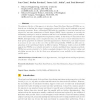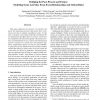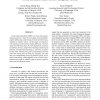1614 search results - page 103 / 323 » Learning Rules and Their Exceptions |
COGSCI
2008
14 years 8 months ago
2008
This article demonstrates the potential of using hierarchical Bayesian methods to relate models and data in the cognitive sciences. This is done using a worked example that consid...
161
click to vote
ATMOS
2011
13 years 10 months ago
2011
The primary objective of this paper is to introduce Fuzzy Rule-Based Systems (FRBSs) as a relatively new technology into airport transportation research, with a special emphasis o...
116
click to vote
CVPR
2012
IEEE
13 years 10 days ago
2012
IEEE
This paper addresses the discovery of activities and learns the underlying processes that govern their occurrences over time in complex surveillance scenes. To this end, we propos...
AINA
2007
IEEE
15 years 4 months ago
2007
IEEE
Event-related potentials (ERP) are brain electrophysiological patterns created by averaging electroencephalographic (EEG) data, time-locking to events of interest (e.g., stimulus ...
105
click to vote
ECAI
2004
Springer
15 years 1 months ago
2004
Springer
Functional genomics is a typical scientific discovery domain characterized by a very large number of attributes (genes) relative to the number of examples (observations). The dang...



